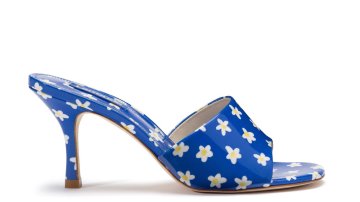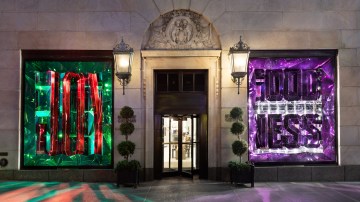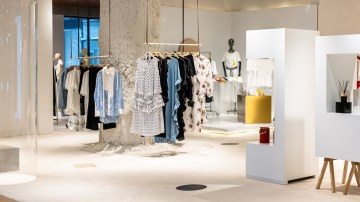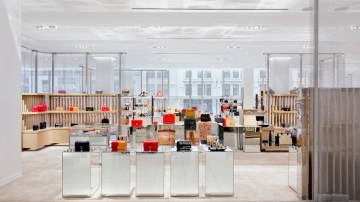 Fashion Briefing: Newly-launched Larroudé hints at the future of fashion-tech
Fashion Briefing: Newly-launched Larroudé hints at the future of fashion-tech Each of Larroude’s 34 styles is equipped with a QR code that cues up a patented technology. It enables elements of referral, affiliate and influencer marketing programs, as well as the “Shazam of fashion” concept that’s been attempted by Kim Kardashian to Amazon.
 How 5 department stores updated their holiday window displays for 2020
How 5 department stores updated their holiday window displays for 2020 For holiday 2020, department stores ensured their NYC window displays spoke to the unprecedented year that was, while also appropriately sparking some much-needed happiness -- despite ample hurdles.
 Fun and convenience: CEO Nancy Green on Old Navy’s priorities for holiday
Fun and convenience: CEO Nancy Green on Old Navy’s priorities for holiday On a call with Glossy, Nancy Green, the president's president and CEO, broke down the company’s holiday strategy, from how it prepared its website for unprecedented traffic to how it differentiated its digital marketing for the noisy season.
 Fashion briefing: The industry’s ‘feast or famine’ inventory problem is impacting holiday sales
Fashion briefing: The industry’s ‘feast or famine’ inventory problem is impacting holiday sales Since the start of the pandemic -- when canceled orders from retailers started rolling in -- fashion brands have been busy correcting their forever habit of producing a glut of inventory. Doing so trumped preparing for the holiday shopping rush, and many are now feeling the negative effects of having...
 Glossy Research: 50% of brands have downsized their brick-and-mortar staff this holiday season
Glossy Research: 50% of brands have downsized their brick-and-mortar staff this holiday season According to a November 2020 Glossy and Modern Retail survey of brand workers, in preparation for this holiday season, brands shifted their resources away from stores to investments that better serve online shoppers.
 Fashion Briefing: Brands are adjusting their holiday tone for 2020
Fashion Briefing: Brands are adjusting their holiday tone for 2020 Rather than pushing must-have gifts, stressing shipping deadlines and investing in happy, jolly campaigns, brands are throwing their holiday playbooks out the window. WIth Americans dealing with unprecedented concerns and hardships, marketers have read the room and are approaching the season with fresh care and consideration.
 Glossy Research: 37% of brands will run holiday promotions for at least 8 weeks
Glossy Research: 37% of brands will run holiday promotions for at least 8 weeks In a November survey of 27 Glossy and Modern Retail readers who work for brands, 37% of respondents said their companies will be running promotions for eight weeks or more this holiday season, while just 18.5% said they ran promotions for eight weeks or more in 2019.
 Fashion Briefing: Ahead of the holidays, fashion brands are permanently lowering prices
Fashion Briefing: Ahead of the holidays, fashion brands are permanently lowering prices Along with launching pay-later services, running constant promotions and ramping up their loyalty perks, fashion companies are permanently cutting their retail prices to win over shoppers. Americans have become more budget-conscious and thoughtful about their purchases, faced with instability, unemployment and more time to reflect on choices. In step, fashion...
 Fashion Briefing: How delayed election results have impacted brands
Fashion Briefing: How delayed election results have impacted brands With election results delayed, brands’ marketing has remained paused, allowing impactful news to take precedence on digital channels. And many stores have stayed boarded up out of uncertainty around how Americans will react when a president is announced. While the extended stop-in-play was to be expected, it puts added pressure...
